Introduction
Dachshund Exercise Needs: Why regular exercise is crucial for your Dachshund's health
- The unique energy levels and exercise requirements of Dachshunds
- How proper exercise prevents obesity and health issues in Dachshunds
- Fun and engaging ways to keep your Dachshund active and entertained
- Understanding the signs of overexertion in Dachshunds
- Benefits of incorporating both physical and mental exercise for Dachshunds
- Tips for creating a consistent exercise routine tailored to your Dachshund’s needs
- How exercise contributes to your Dachshund’s overall well-being and happiness
1. Understanding Your Dachshund’s Exercise Requirements
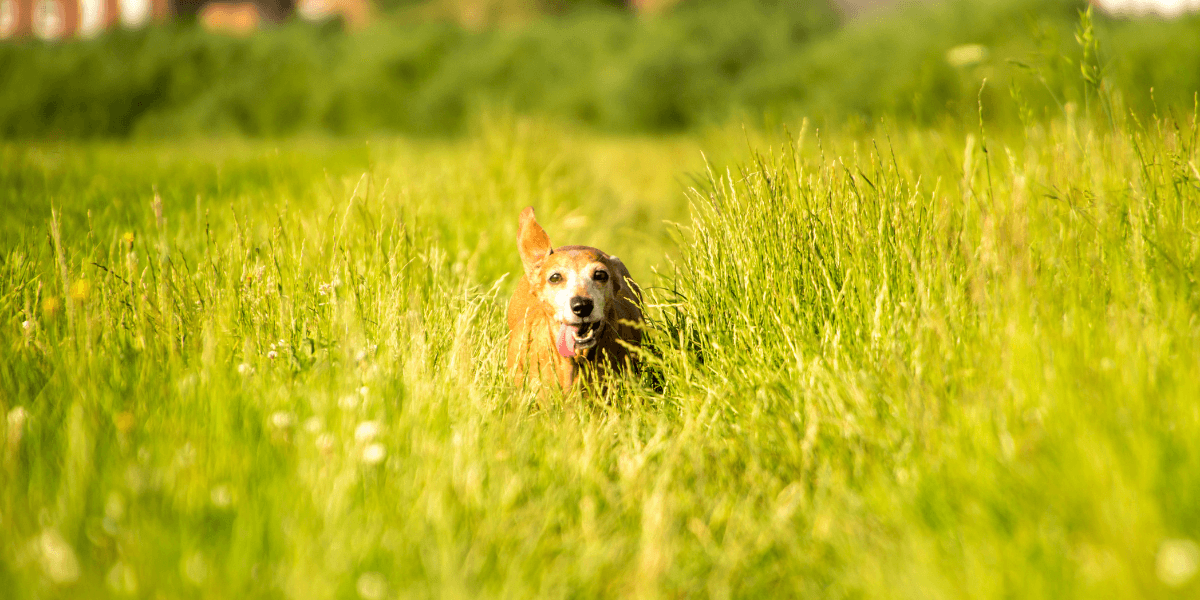
Dachshunds, also known as "wiener dogs," are small but mighty
Their exercise needs vary depending on age, health, and activity level
Here’s a breakdown:
- Puppies: High energy levels require frequent play sessions and short walks
- Adults: Need about 30-60 minutes of exercise daily, divided into multiple sessions
- Seniors: Exercise should be adjusted to their comfort level, gentler activities are ideal
Tips:
- Observe your Dachshund’s behavior to gauge their energy levels
- Consult with your vet to tailor an exercise plan based on your dog’s specific needs
2. Fun Activities to Keep Your Dachshund Active
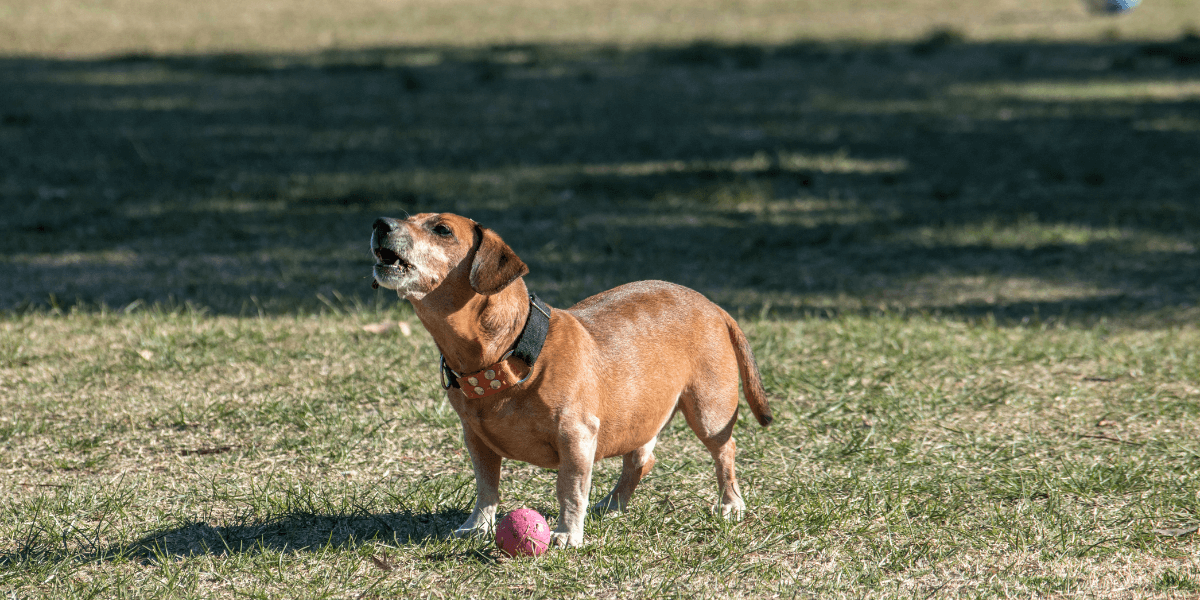
Keeping your Dachshund engaged in various activities can prevent boredom
Here are some enjoyable options:
- Daily Walks: Essential for cardiovascular health and mental stimulation
- Interactive Toys: Engages their mind and body, such as treat-dispensing toys or puzzle games
- Playdates: Socializing with other dogs can be both fun and a great workout
- Fetch: Despite their short legs, many Dachshunds love playing fetch and it’s a great exercise
Best Practices:
- Vary activities to keep your Dachshund interested and prevent overuse injuries
- Always supervise playtime to ensure safety
3. Exercise for Different Dachshund Sizes and Types
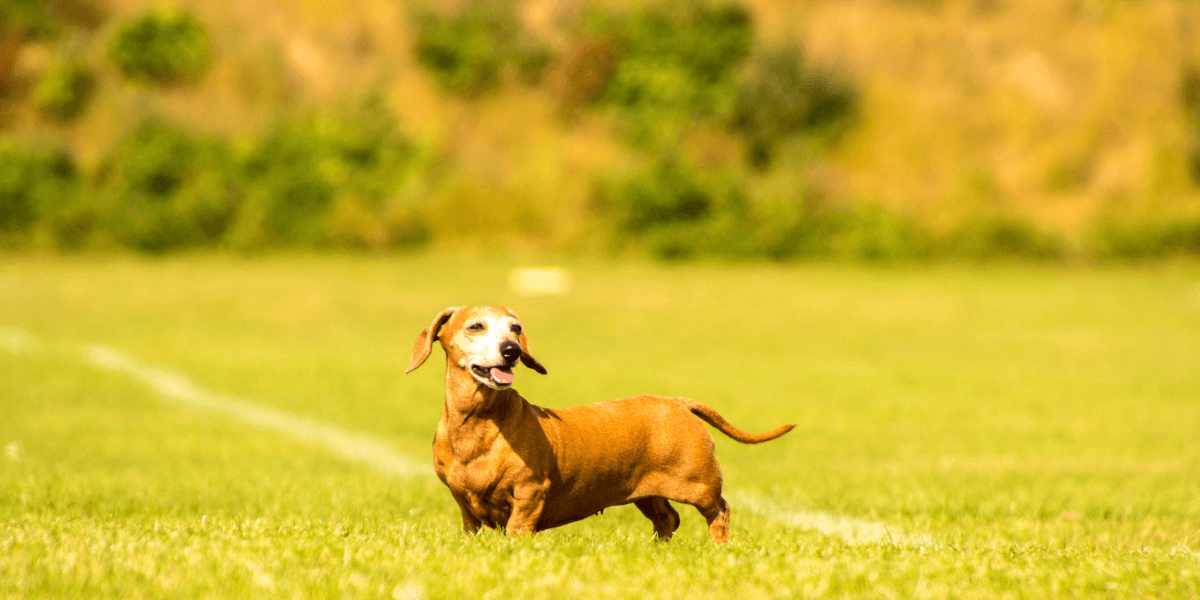
Dachshunds come in three coat types: smooth, long-haired, and wire-haired
While their exercise needs don’t vary much with coat type
Their physical structure might influence their activities:
- Smooth-Coated Dachshunds: More prone to overheating; opt for cooler exercise times
- Long-Haired Dachshunds: Their coats can tangle; check for matting after outdoor play
- Wire-Haired Dachshunds: Their unique coat needs regular grooming, especially after outdoor adventures
Tips:
- Adjust exercise routines based on coat care needs and the weather
- Regular grooming is essential to prevent tangles and mats
4. Managing Your Dachshund’s Weight Through Exercise
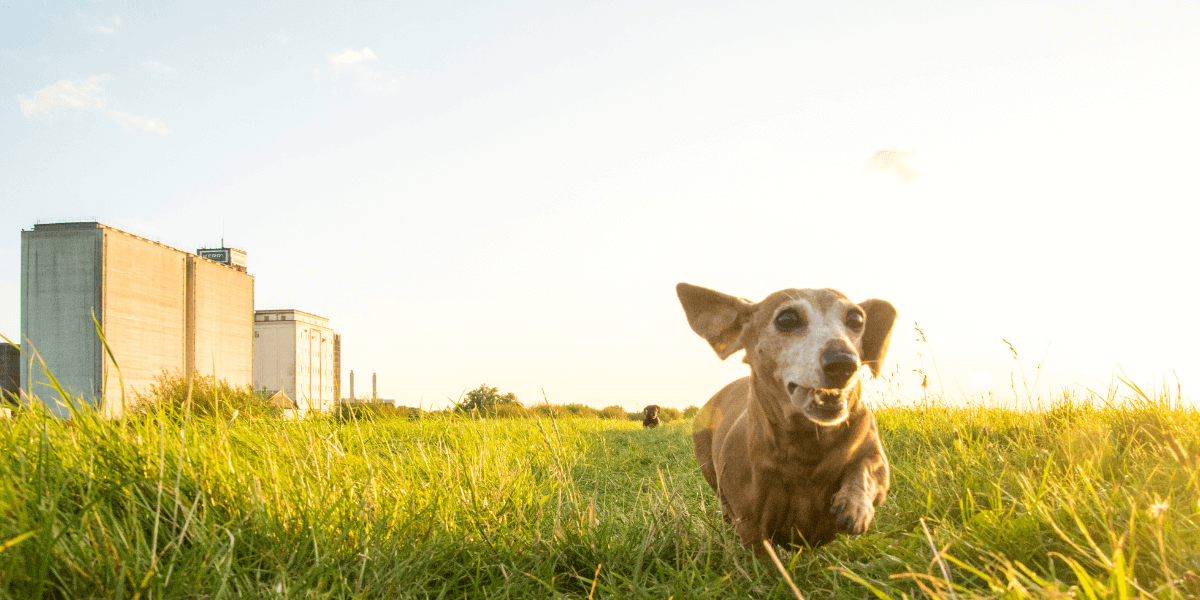
Obesity is a common issue among Dachshunds due to their low to the ground stature.
Regular exercise is crucial in managing their weight and preventing health issues:
- Maintain a Balanced Diet: Combine exercise with a healthy diet for optimal weight management
- Track Weight: Regularly monitor your Dachshund’s weight and adjust exercise accordingly
- Incorporate Cardio: Activities like brisk walks and playful games are great for burning calories
Advice:
- Consult your vet to determine your Dachshund’s ideal weight
- Avoid overfeeding and ensure they are getting the right balance of nutrients
Keep your Dachshund comfy after exercise with insights from The Best Orthopedic Beds for Great Danes.
5. Exercising Dachshunds with Health Concerns
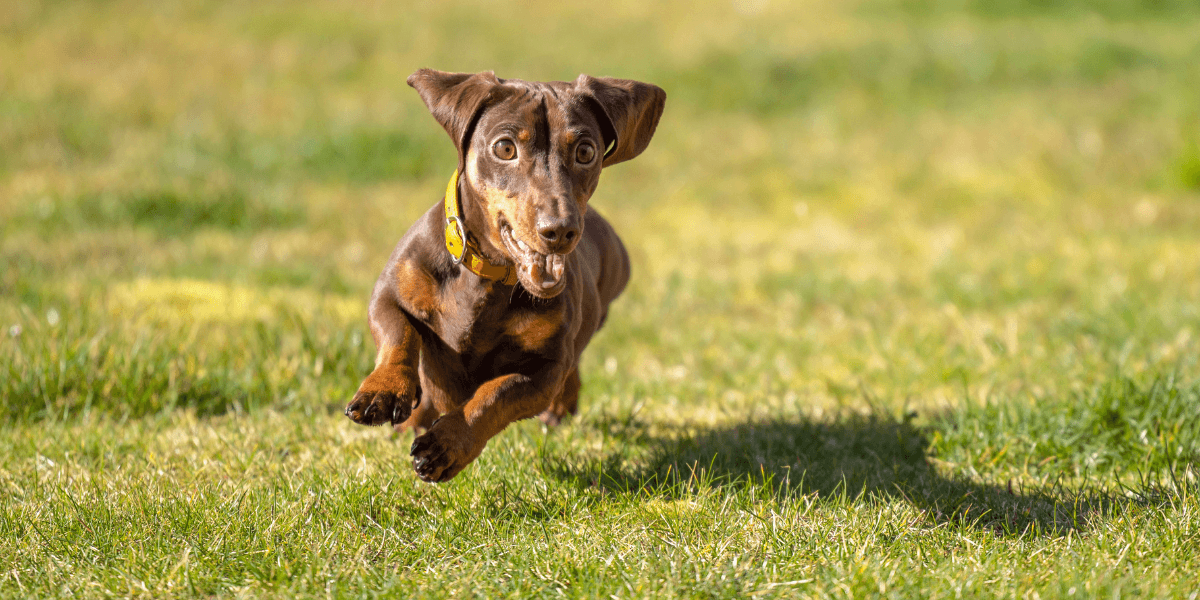
Dachshunds are prone to specific health issues, such as intervertebral disc disease (IVDD).
Tailoring their exercise routine to accommodate these concerns is vital:
- Low-Impact Exercises: Opt for gentle activities like walking or swimming to protect their back
- Avoid Jumping: Prevent high-impact activities that can exacerbate back problems
- Regular Vet Check-ups: Ensure your Dachshund’s exercise routine is safe based on their health condition
Best Practices:
- Always consult with your vet before starting a new exercise routine
- Monitor for any signs of discomfort or pain and adjust activities as needed
6. Indoor vs. Outdoor Exercise: Finding the Right Balance
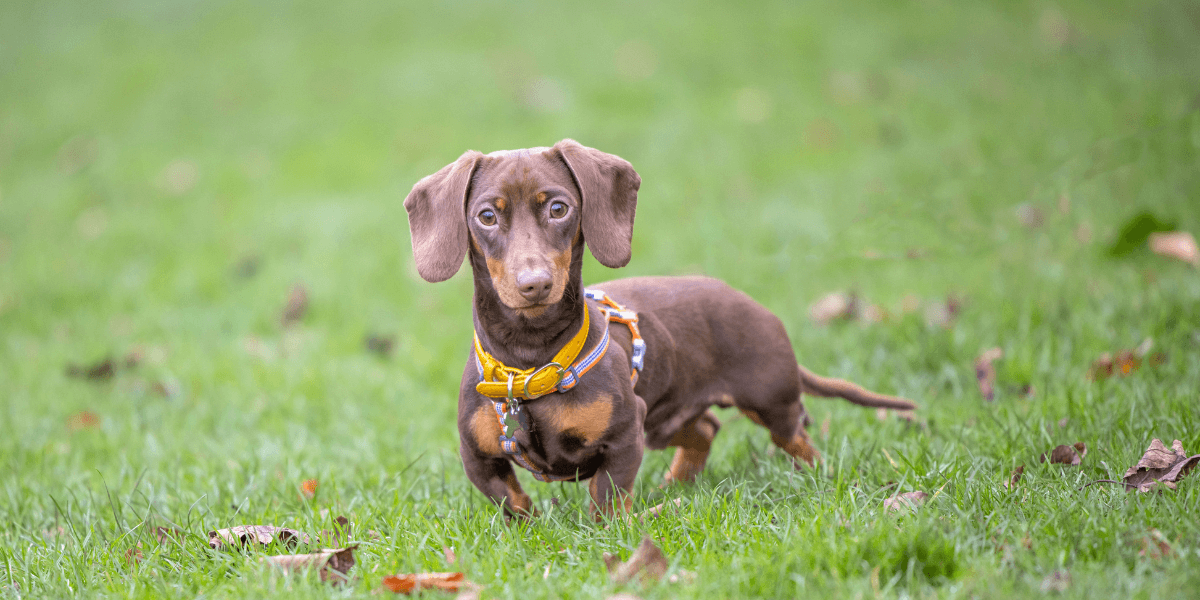
While outdoor activities are fantastic, indoor exercise can be equally beneficial:
- Indoor Play: Use interactive toys, create a mini obstacle course, or engage in tug-of-war
- Outdoor Play: Enjoy walks, trips to the dog park, and playtime in the yard
Tips:
- Create a variety of indoor and outdoor activities to keep your Dachshund
- Ensure indoor play areas are safe and free from hazards
Learn how safe exercises help prevent issues like Hip Dysplasia in Great Danes for your Dachshund too!
7. Developing a Routine That Works for You and Your Dachshund
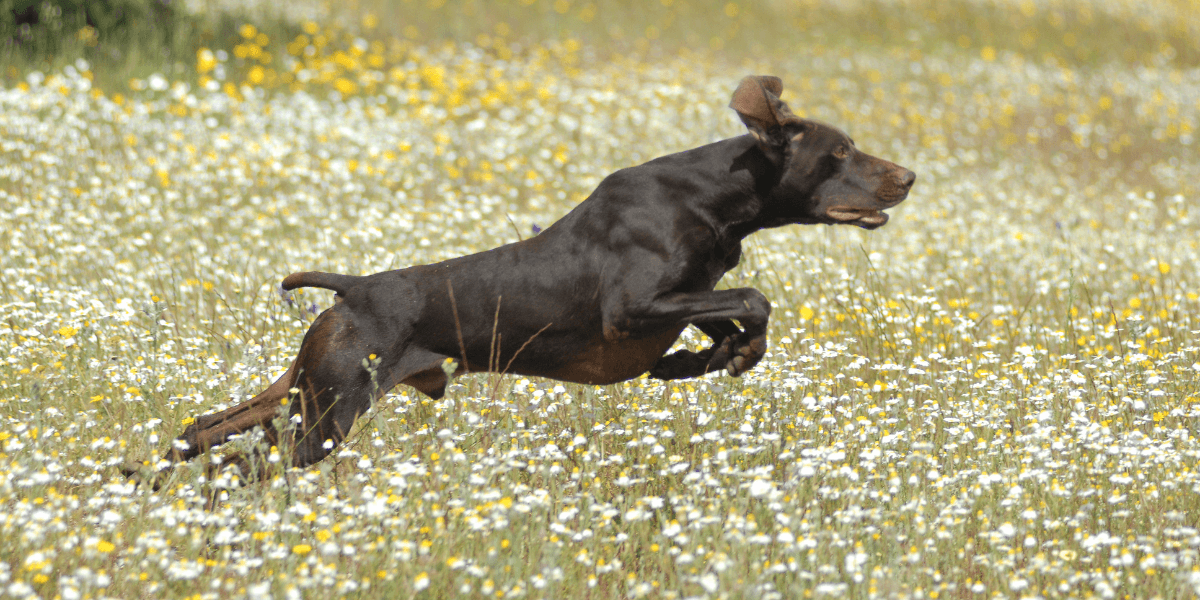
Consistency is key in maintaining your Dachshund’s fitness.
Establish a routine that fits your schedule and your dog’s needs:
- Daily Routine: Aim for consistent exercise times each day to build a habit
- Adapt as Needed: Adjust the routine based on your Dachshund’s age, health, and seasonal changes
- Set Goals: Track progress and set fitness goals to keep both you and your Dachshund motivated
Advice:
- Use a calendar or app to schedule and track exercise sessions
- Reward your Dachshund with positive reinforcement to make exercise enjoyable
Discover tips to create routines with Great Dane Training and apply them to your Dachshund!
FAQs
1. How much a Dachshund exercise needs daily?
- A Dachshund needs at least 30 minutes to 1 hour of exercise per day
2. What are some fun exercises for my Dachshund?
- Play fetch, go for walks, and try agility training for variety
3. Can Dachshunds exercise too much?
- Yes, over-exercising can strain their back; balance is key
4. How can I meet my Dachshund exercise needs indoors?
- Use interactive toys, play hide and seek, or set up an indoor obstacle course
5. Why is regular exercise important for Dachshunds?
- It prevents obesity, keeps their back healthy, and provides mental stimulation
6. How can I tell if my Dachshund is getting enough exercise?
- A well-exercised Dachshund will be active, happy, and not overweight
7. How do Dachshund exercise needs differ from other breeds?
- Dachshunds require less intense exercise but still need regular activity to stay fit
Conclusion
- Meeting your Dachshund exercise needs is essential for their health and happiness
- Regular physical activity supports a healthy weight and prevents common health issues
- Find enjoyable activities that suit your Dachshund’s energy levels and preferences
- Always watch for signs of overexertion to ensure safe and effective exercise
- Consistency is key: make exercise a regular part of your Dachshund's daily routine
- Exercise helps strengthen your bond and improve your Dachshund’s overall quality of life
- Addressing your Dachshund exercise needs promotes long-term health and well-being
Ready to take your Dachshund’s fitness to the next level?
Share this post with fellow Dachshund owners!
References
Further Reading:
- How much exercise does a Miniature Dachshund need?
- The Best Joint Supplements for Dogs with Hip and Joint Pain
- Exercise Requirements for a Healthy Dachshund
- Dachshund Exercise Needs
- A Guide to Preventing Joint Problems in Dogs
By following these tips and engaging in consistent exercise!
You’ll ensure your Dachshund remains fit, happy, and full of life!




